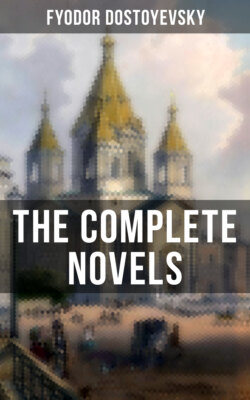Читать книгу The Complete Novels of Fyodor Dostoyevsky - Fyodor Dostoyevsky - Страница 128
На сайте Литреса книга снята с продажи.
CHAPTER II
ОглавлениеTable of Contents
AT THAT TIME, just a year ago, I was still working on the staff of some papers, wrote articles, and was firmly convinced that I should succeed one day in writing something good on a larger scale. I was sitting over a long novel at that time, but it had all ended in my being here in the hospital, and I believe I am soon going to die. And since I am going to die, why, one might ask write reminiscences?
I cannot help continually recalling all this bitter last year of my life. I want to write it all down, and if I had not found this occupation I believe I should have died of misery. All these impressions of the past excite me sometimes to the pitch of anguish, of agony. They will grow more soothing, more harmonious as I write them. They will be less like delirium, like a nightmare. So I imagine. The mere mechanical exercise of writing counts for something. It will soothe me, cool me, arouse anew in me my old literary habits, will turn my memories and sick dreams into work — into occupation…. Yes, it is a good idea. Moreover, it will be something to leave my attendant if he only pastes up the window with my manuscript, when he puts in the double frames for the winter.
But I have begun my story, I don’t know why, in the middle. If it is all to be written, I must begin from the beginning. Well, let us begin at the beginning, though my autobiography won’t be a long one,
I was not born here but far away in a remote province. It must be assumed that my parents were good people, but I was left an orphan as a child, and I was brought up in the house of Nikolay Sergeyitch Ichmenyev, a small landowner of the neighbourhood, who took me in out of pity. He had only one child, a daughter Natasha, a child three years younger than I. We grew up together like brother and sister. Oh, my dear childhood! How stupid to grieve and regret it at five-and-twenty, and to recall it alone with enthusiasm and gratitude! In those days there was such bright sunshine in the sky, so unlike the sun of Petersburg, and our little hearts beat so blithely and gaily. Then there were fields and woods all round us, not piles of dead stones as now. How wonderful were the garden and park in Vassilyevskoe, where Nikolay Sergeyitch was steward. Natasha and I used to go for walks in that garden, and beyond the garden was a great damp forest, where both of us were once lost. Happy, golden days! The first foretaste of life was mysterious and alluring, and it was so sweet to get glimpses of it. In those days behind every bush, behind every tree, someone still seemed to be living, mysterious, unseen by us, fairyland was mingled with reality; and when at times the mists of evening were thick in the deep hollows and caught in grey, winding wisps about the bushes that clung to the stony ribs of our great ravine, Natasha and I, holding each other’s hands, peeped from the edge into the depths below with timid curiosity, expecting every moment that someone would come forth or call us out of the mist at the bottom of the ravine; and that our nurse’s fairy tales would turn out to be solid established truth. Once, long afterwards, I happened to remind Natasha how a copy of “Readings for Children” was got for us; how we ran off at once to the pond in the garden where was our favourite green seat under the old maple, and there settled ourselves, and began reading “Alphonso and Dalinda” — a fairy-story. I cannot to this day remember the story without a strange thrill at my heart, and when a year ago I reminded Natasha of the first lines: “Alphonso, the hero of my story, was born in Portugal; Don Ramiro his father,” and so on, I almost shed tears. This must have seemed very stupid, and that was probably why Natasha smiled queerly at my enthusiasm at the time. But she checked herself at once (I remember that), and began recalling the old days to comfort me. One thing led to another, and she was moved herself. That was a delightful evening. We went over everything, and how I had been sent away to school in the district town-heavens, how she had cried then! — and our last parting when I left Vassilyevskoe for ever. I was leaving the boarding-school then and was going to Petersburg to prepare for the university. I was seventeen at that time and she was fifteen. Natasha says I was such an awkward gawky creature then, and that one couldn’t look at me without laughing. At the moment of farewell I drew her aside to tell her something terribly important, but my tongue suddenly failed me and clove to the roof of my mouth. She remembers that I was in great agitation. Of course our talk came to nothing. I did not know what to say, and perhaps she would not have understood me. I only wept bitterly and so went away without saying anything. We saw each other again long afterwards in Petersburg; that was two years ago. Old Nikolay Sergeyitch had come to Petersburg about his lawsuit, and I had only just begun my literary career.
